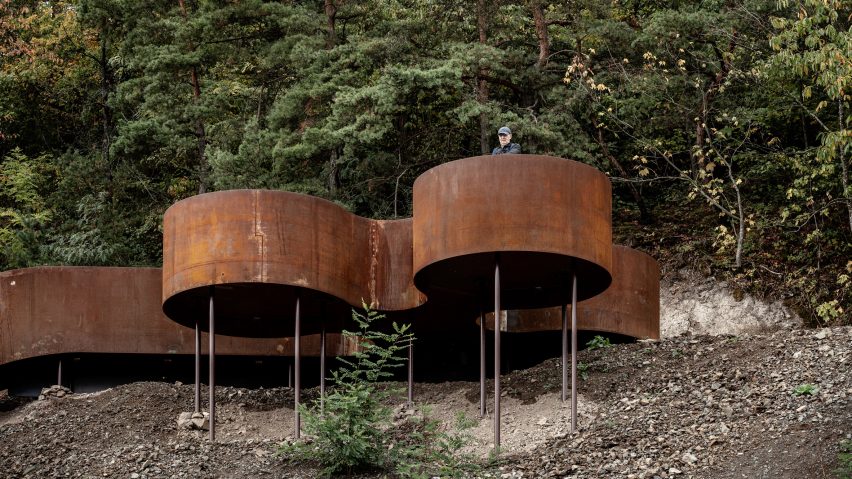A grand gateway and a hillside belvedere are among a series of structures that Reiulf Ramstad Arkitekter has built in eastern France, to direct tourists towards a historic quarry.
The Oslo-based studio, led by architect Reiulf Ramstad, created the landscape interventions along the Chemin des Carrières, an 11-kilometre trail through the rural villages and landscape of Rosheim, on the outskirts of Strasbourg.
The path follows the route of the Rosheim-St Nabor railway, which was opened in 1902 to serve the quarries of Saint-Nabor, but which ultimately closed in 2002.
Reiulf Ramstad Arkitekter worked with landscape studio Parenthèse Paysage to create designs for all five of the old station stops, each responding to the peculiarities of its location. Some offer shelters, while others offer visitors new or interesting viewpoints.
"Along the 11-kilometre path goes a story, which the stops split into five chapters of different sequences of landscapes, offering varied universes and highlighting remarkable sites," explained the studio.
"Unusual elements punctuate the way, aiming at awakening the visitor's senses, and water is encountered repeatedly."
At St Nabor, the stop closest to the former quarries, a belvedere – a structure positioned to take advantage of a scenic view – is installed into the hillside.
Formed of Corten steel, its undulating surfaces create a platform divided up into circular segments.
The platform is raised up on stilts, to negotiate the slope of the landscape. It is accessed via a long staircase that extends up from the base of the hill.
"From this viewpoint inspired by a four-leaf clover, the visitor will feel lucky to enjoy the view of such a beautiful territory," said Reiulf Ramstad Arkitekter.
Ottrott is the next stop along the route. There are various new additions here, including a bridge, concrete landscaping and a sheltered seating booth, along with some heritage elements.
At Leonardsau, two angular plates of Corten create a sculptural gateway between the forest and the open landscape, while Boersch features a seating area at the edge of the river.
The furthest stop from the quarries, where most people begin the walk, is Rosheim.
This space features curving walls of Corten steel that frame seating areas, imagined as spaces for quiet reflection.
"The pavilion has a labyrinthine character and play with an irregular concave and convex interior," said the design team.
"Openings are created to open or close the sculpture to chosen views of the surrounding landscape."
Reiulf Ramstad Arkitekter won a competition to design the Chemin des Carrières installations. The firm has previously worked on several impressive landscape projects, include the Trollstigen and Havøysund tourist routes in Norway.
The project was completed for €4 million.
Photography is by Florent Michel/11h45.

